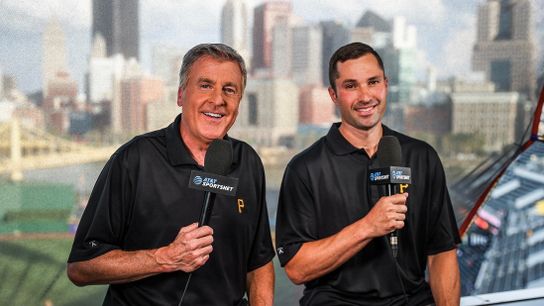Most sports fans don't care much about behind-the-scenes dealings of TV networks. Fans care about one thing and one thing only: Where can I find the game on TV?
But if you're a Pirates or Penguins fan, you may need to start paying closer attention to the TV stuff, because there could be some trouble brewing thanks to the ever-changing world of broadcasting financials.
News broke a few days ago, in an article by Sportico, that AT&T SportsNet came up short on the amount it owed the Pirates in a recent rights distribution payment. The Astros and Rockies also reportedly were shorted on payments by their AT&T SportsNet carriers.
From Sportico:
"The three AT&T SportsNet brands in recent weeks have handed over lighter-than-expected envelopes to their respective MLB franchise partners.
"An executive with direct knowledge of the RSNs’ financial dealings confirmed to Sportico that the AT&T outlets in Denver, Houston and Pittsburgh submitted their most recent rights payments to their MLB clubs in a timely fashion, although the disbursements were not commensurate with the contracted rates. The teams impacted by the shortfall are the Rockies, Astros and Pirates.
"The precise amount of the funds withheld is not known but is said to be significant enough to have catalyzed concerns about the long-term viability of the three networks. According to one insider, the partial payments may be interpreted as a signal that new-ish owners Warner Bros. Discovery are eager to get out of the RSN business."
So far, there has been no indication of the Penguins being shorted any money, just the Pirates.
Then again, even that element has been disputed. As Dejan Kovacevic wrote in the Friday Insider: "The Pirates were included among teams to have had a payment shorted, but I'm told that's inaccurate in that Pittsburgh's payment isn't even due yet."
AT&T SportsNet has not responded to a message from DKPS seeking comment about this matter.
For Pirates and Penguins fans, the most important component of all this is whether you'll still be able to watch baseball and hockey games on AT&T SportsNet going forward. And if not on that network for some reason, then where?
For the franchises themselves, worries over whether they'll actually receive the full amount of money they're owed from the network could be an ongoing concern.
There is significant concern in the broadcasting world regarding regional sports networks (RSNs), primarily stemming from last week's bombshell news that Diamond Sports Group defaulted on $140 million in payments and is nearing bankruptcy.
Diamond Sports Group owns the Bally regional sports networks that are home to 14 MLB franchises: Diamondbacks, Braves, Reds, Guardians, Tigers, Royals, Angels, Marlins, Brewers, Twins, Padres, Cardinals, Rangers and Rays.
Not only could fans in those baseball markets face uncertainty about where to find broadcasts, the teams themselves could end up losing a lot of money if their rights deals fall through.
Again, whether something like that ultimately could end up happening in Pittsburgh remains to be seen. Warner Bros. Discovery and The AT&T SportsNet umbrella are different companies than the Diamond Sports Group and Bally, but the latter's struggles could be a sign of things to come for many or all players in the RSN broadcast spectrum.
MLB Commissioner Rob Manfred said a few days ago that the league would step in to help any clubs that may lose their current broadcast outlet because of Diamond Sports Group's financial issues.
"In the event that MLB stepped in, what we would do is we would produce the games, we would make use of our asset, the MLB Network, to do that. We would go directly to distributors -- meaning Comcast, Charter, the big distributors -- and make an agreement to have those games distributed on cable networks," Manfred said during a press conference in Phoenix on Wednesday.
The bottom line in all this is that RSNs face real challenges going forward, and at this stage, it's difficult to gauge how everything will play out.
Manfred did not discuss the AT&T SportsNet situation during his press conference, only the Diamond Sports Group troubles and how they affect the big picture.
"It's hard to escape the reality that change in media consumption has been particularly hard on the RSNs," Manfred said. "Obviously, we want all of our broadcast partners to be successful. We don't want them to have financial difficulties. We have been spending a lot of time and effort trying to work with Diamond to figure out exactly where they are."

